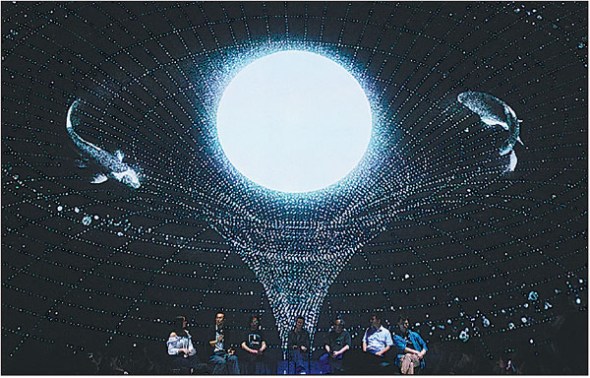
Guest speakers from fields of IT, art and literature attend a forum on "uploading" organized by Future Affairs Administration and Today Art Museum on Sept 10 in Beijing. (Photo provided to China Daily)
"If there is ever a sci-fi movie set in Beijing, this is the place to shoot," Ji jokes.
The company has around 20 employees. They maintain an online daily newsletter called Non-Exist, publishing original Chinese sci-fi works and translated works, sci-fi criticism, and popular science articles.
Right now, their online accounts on various social media platforms, such as Sina Weibo and WeChat, have gathered more than 1 million followers.
They also keep contact with around 70 sci-fi writers at home and abroad.
"The number of sci-fi writers in China is still too few," Ji says. "And established writers are not so diligent in producing new works, as most of them only write part time."
In June, the company released a project with Liu, called The Three-Body Cosmos, encouraging amateur writers to submit stories against the backdrop of Liu's Three-Body series.
They have also organized tours for sci-fi writers to watch rocket launches, visit laboratories, and talk with scientists at the Chinese Academy of Sciences.
Last year, they led a group to Guizhou province to see FAST, the world's largest radio telescope which probes gravitational waves and dark matter, and listens for any transmissions from alien civilizations, if there are any.
"We try to widen the views of our sci-fi writers, so that they can write eye-opening stories for readers," Ji says.
To become the idea generator for Chinese science fiction is the goal for Ji and her company.
Still a niche genre
In the English-speaking world, the 1930s to 1950s is known as the "golden age of science fiction", as many enduring sci-fi works and famous sci-fi authors, such as Jewish-American writer Isaac Asimov and British science fiction writer Arthur Clarke, emerged during these decades.
"This golden age accompanied the rapid development in science and technology in the West," says Ji. "Now technology is marching at fast pace in China, so there is a high possibility that many good Chinese sci-fi works will be born in the years to come."
Besides publications, Ji says filmmakers are also eyeing the sci-fi genre, which will bring Chinese science fiction to a larger audience.
Apart from films adapted from Liu's works that are in production, Red Ocean, a novel by popular sci-fi writer Han Song, is also being adapted into a feature animation.
Science fiction has also become the topic of many academic seminars over the past three years.


















































